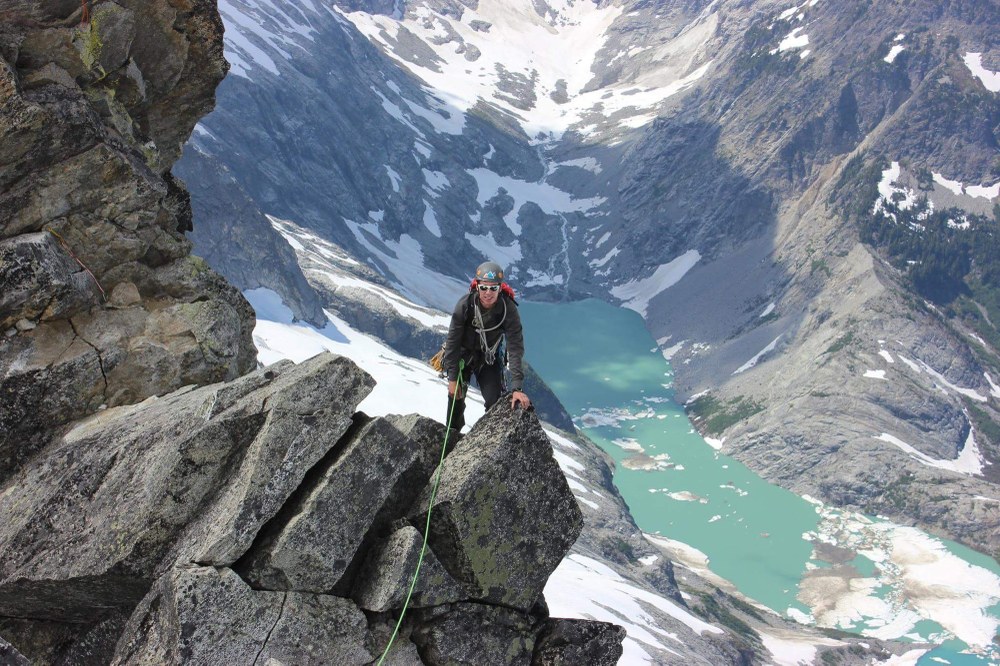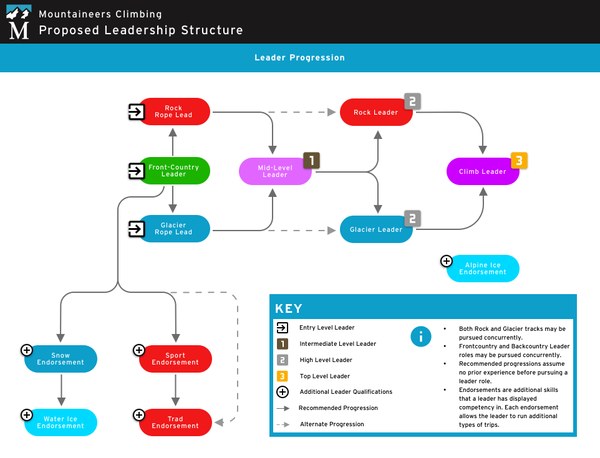
Progressive Climbing Education (PCE) is a strategic initiative to advance our Mountaineers climbing programs, make our suite of volunteer-led Climbing Programs more fun for volunteers to run, easier to recruit volunteers for, more attractive to new climbers (especially those coming out of the gym), and more advanced for our highly-skilled volunteers and students. This quarterly communication is intended to provide regular updates about each committees' projects, offer transparency, and ensure that all branches are able to provide feedback and input to proposed changes to the climbing programs.
Summer 2019 Happenings
The days of summer are quickly starting to feel like fall is around the corner, and with fall comes the busy season for many volunteers. Programs will start ramping up and committees begin to meet again. It’s time to fill everyone in on the work that has been happening with our PCE committees over the past several months, and what to expect in the near future. Some committees have been very active this summer and some less so. As we move towards the fall climbing summit on October 26th, we’d like everyone to be up to speed on what is happening in the PCE, and be sure you all have a chance to provide inputs and comments ahead of time.
In case you missed it, read the last PCE update and as always, remember to contact your branch PCE committee representative (listed in the last PCE update blog).
Leadership Development Committee (LDC)
All of our climbing committees face a shortage of active climb leaders - some years more than others. One contributing factor is a lack of a transparent processes and description of requirements for our aspiring leaders. We also have an opportunity to create more “entry-level” leadership roles for folks who demonstrate leadership skills but may lack the extensive training and experience that our Climb Leaders have, which would both expand our leader pool and provide a progression for future climb leaders. Most climbing committees currently have multiple layers of climb leadership, and although requirements at each branch differs, we have only one Climb Leader Badge, and committees are left to document the leader level in the roster notes. To address these challenges and capitalize on an opportunity, the LDC has been working very hard on developing a new organization-wide climb leader structure. They have spent countless hours working and re-working a structure that provides a lower barrier to entry for new leaders, and at the same time maintains or improves on quality. The resulting leader progression allows less experienced leaders the opportunity to gain skills and advance to higher level leader roles step by step. This modular leadership structure also allows leaders to focus on the disciplines in which they are most skilled and interested. This work has been driven by the information provided in feedback surveys from our climbing community, as well as feedback from all of the branches about their current successes and challenges.
With a leader progression that has been well-vetted and the committee is happy with, the LDC is in the process of documenting the standard for each level of climbing leader. Their goal is to create a clearly documented “job description” for each leader so prospective and experienced leaders alike can understand exactly what is required of them, and how to become a leader. Committee members will be reaching out to their climbing committee leaders in the coming weeks for input and to answer questions about the work being done.

Learn More About Each Leader Role
The LDC also plans to integrate any feedback or changes to their work during the months of September and October, with the goal of presenting a highly-vetted new leader progression scenario that will be voted on for approval at the October 26th Climbing summit. Because of the large body of work being done, it is important that anyone who has questions or concerns learn more in advance of the summit meeting, where there will be a vote to implement these standards.
Technical Advisory Committee (CTAC)
The Technical Advisory Committee has been churning out reports! Last time we updated you, they had a new format for vetting and publishing information, and their first report was in the works. Now, the committee has published 2 full reports, is writing 3 more to be released soon, and has at least 5 additional investigations in the pipeline. The committee also built a new webpage where you can read the published reports, learn more about the committee, and request investigations.
The group recently met in person to test fixed-point belays. They hope in the near future to purchase testing equipment and continue to do more extensive testing of techniques and equipment.
If you have a topic for CTAC to investigate, be sure to visit their webpage and submit your request!
Curriculum (CCC)
The Climbing Curriculum Committee is still working on goals and objectives for all courses in The Mountaineers. The busyness of summer has slowed the progress but the group is still working to document all of our courses.
Access & Stewardship (CASC)
CASC has been on hiatus during the summer as members have been busy with personal life. This committee has been focused on identifying new places to teach and run field trips. They still need some additional members to help out once they start running scouting trips again, so if you are interested please contact Nick Block for more information.
National Climbing Certificates
As you may already know, The Mountaineers have been working on a set of national (and internationally recognized) recreational climbing certificates.
The Mountaineers is partnering with Colorado Mountain Club, the Mazamas, and the American Alpine Club to draft national standards that meet UIAA qualifications for our leader trainers. Now known as the Mountain Education Alliance, this group of organizations is focusing efforts on delivering high quality recreational standards to recognize top volunteers. To date, we have begun work on Scrambling, Top Rope Climbing, Sport Climbing, Single-Pitch Trad Climbing, and Multi-Pitch Climbing, and many of our volunteers have been part of this effort.
Each of these educator standards was drafted by a standards committee which included volunteer and staff representatives from all organizations, plus folks acting in a “consulting” role from organizations like National Outdoor Leadership School (NOLS), Outward Bound, and the American Mountain Guide Association (AMGA).
Now, The Mountaineers needs to certify our volunteers. Because each of the organizations involved in this process have different needs, each club is creating their own certification process. Our goal is that they are roughly aligned, but the first step is to figure out what will work for us. We are creating a task force to help develop our training program to certify the first group of volunteers. As a part of this process, these volunteers will be some of the first in the country to obtain these certifications.
The Mountaineers volunteers who have been part of our National Climbing Standards Development: Sean Albert, Carol Barmon, Brian Booth, Suzy Diesen, Andre Gougisha, Chase Gruszewski, Dennis Kiilerich, Takeo Kuraishi, Joe Osowski, Chris Spanton, Tristan Steed, Andy Tangsombatvisit, Margot Tsakonas, Tony Tsuboi, Jill Uthoff, Tess Wendel
Want to learn more about PCE?
Progressive Climbing Education Committees (PCE) work to advance our organization as one team. We work together with representatives across all climbing committees to find common ground. The work of the PCE aims to reduce confusion for our members, leaders, and students by creating a more consistent and clear climbing program. You can learn more about the PCE and Vision 2022 here. For a detailed history of the progress we made through the PCE process, look through the various blog posts on the website.
Want To Get Involved?
If you’d like to be a part of the work happening within the PCE, contact the committee chair or Nick Block (nickb@mountaineers.org) the Volunteer Collaborations Manager. Your feedback and input is critical to the success of these PCE programs.
Add a comment
Log in to add comments.in this blog it mentions contacting your PCE branch representative? Where does one find ones PCE branch rep
Branch reps are listed in the last PCE update blog. I updated to clarify. Thank you!
 Nick Block
Nick Block